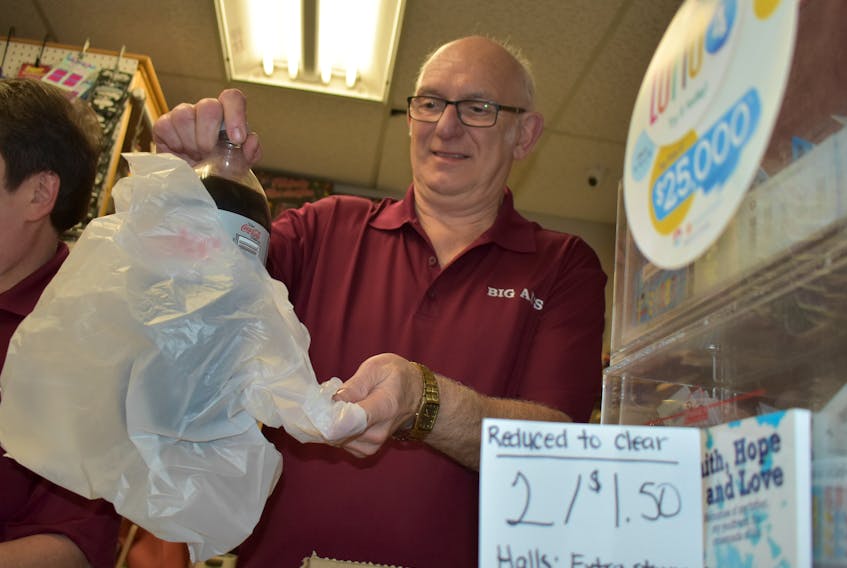PICTOU – County council supports a province-wide ban on plastic bags.
Councillors voted in favour of a motion Tuesday to send their support for a Nova Scotia ban to Pictou County Shared Services which in turn is expected to collect responses from the six local municipal units and let the province know how it feels collectively.
The vote was taken following a presentation by Pictou County Solid Waste on the status of plastic film and the problems that recycling facilities are now facing as the product is no longer in demand.
“It seems simple,” said County Warden Robert Parker. “Ban plastic bags. There is no market for them.”
Plastic film includes those indicated by #2 and #4 and include items such as shopping bags, overwrap (such as toilet paper packaging), pallet wrap, frozen vegetable bags/soil bags; it also includes the blue bags used for recycling. Nova Scotians use 300-500 million shopping bags annually. Plastic film is banned from all seven provincial landfills in Nova Scotia.
This winter, Halifax Regional Municipality has run out of storage room for the product so the province has allowed it to put plastics in landfills for six months which will give it time to come up with a more province-wide permanent solution.
Plastic film collected in Pictou County goes to the recycling facility in Kemptown which MacDonald said is facing similar issues. She said the Kemptown site handles 407,255 plastic bags a day.
MacDonald said a similar presentation is being taken to municipalities across the province seeking out support for a Nova Scotia ban on plastic bags and so far, 26 municipalities have supported it, two has said no and two want more time to consider it.
She told council that government, waste management reps and retailers have been working hard to come up with a solution to the plastic problem and have come up with three options.
The ideal option would be to have the province legislate a ban on plastic bags such as those used for shopping or groceries, she said.
The second option is to have people pay for the use of plastic bags at checkouts which has had some success in other provinces and reduced bag usage by 50 per cent.
Voluntary participation is the third option which goes hand-in-hand with educating the public on using something other than plastic to take their groceries or shopping goods home in.
MacDonald said having individual municipalities impose a plastic bag ban is not as effective as having the province-wide ban because shoppers could just travel to another municipal unit to shop for the convenience of bags.
Coun. David Parker said he was also in favour of a plastic bag ban, but would like to see the public educated on it first.
“I am a fan of education,” he said. “There should be a three to six month campaign telling them it will be banned.
Coun. Larry Turner questioned if more would be done in regards to limiting the packaging on products as well since it also falls under plastic films.
MacDonald said discussions have been ongoing on this front with manufacturers to make them more responsible for their packaging.
Coun. Debbie Wadden expressed her concern that some organizations such as the food banks rely on plastic bags for their clients to carry home their goods since many don’t have vehicles.
MacDonald said this concern has been looked at as well, but she said there are alternatives to plastic bags such as recycling clothing into bags for carrying purposes.
Councillors did point out that some stores such as Costco don’t offer bags while Wal-Mart charges a fee for them. Steps have also been taken locally by some grocers to offer customers boxes to pack their groceries in.
New Glasgow council also voted in favour of writing a letter of support of a province-wide ban on single-use plastic bags, to the environment minister and the local MLAs, at its committee of the whole meeting.
Deputy Mayor Clyde Fraser noted that such a ban would have an impact on businesses, changing how they package their goods – he also said that such plastic bags should not be going into landfills.
Province must take initiative on solution
Jim Cormier, director of the Atlantic division of the Retail Council of Canada said the province must take the initiative on whatever solution is offered in the plastic bag debate.
He said council sees a need for the reduction of the plastics considering the environmental crisis the province is now facing and a ban imposed by the province is one option that could be accepted by retailers.
However, he stressed, If such a ban does take place, it needs to be mandated by the government and not individual stores or municipal units because of the competition factor.
“We are looking for solutions like everyone else,” he said. “If the province decides to go with the ban we are not opposed to it as long as it is province wide.”
Alternatively, a much better solution might be to follow the lead of Quebec and Ontario in the 1990s which mandated retailers and industries to come up with their own plastic bag reduction plan.
Cormier said there were reductions of up to 60 per cent in some bags and having the government mandate it allowed it to be a level playing field for all retailers. The process involved inspectors visiting businesses making sure they were being compliant.
He said if all parties involved agree a fee on bags is a better option than it must also be imposed province wide and individual retailers should have a say on what the fee will be and where the collected money will be used afterwards.
“Sometimes incentives like that can help,” Cormier said. “Beyond that, we wouldn’t want to see program where government controls the fee. This creates a bureaucratic administrative nightmare and people don’t know where bag money is going to.”
He believes retailers will do their best to put money towards environmental initiatives and the communities they are serving.
WITH FILES BY SAM MACDONALD









